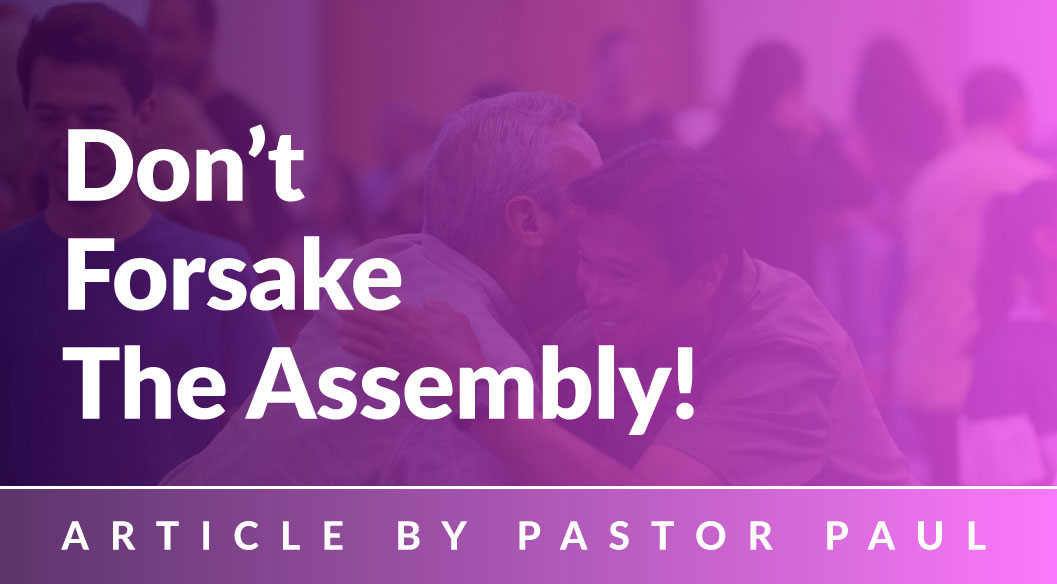23 Let us hold fast the confession of our hope without wavering, for He who promised is faithful; 24 and let us consider how to stimulate one another to love and good deeds, 25 not forsaking our own assembling together, as is the habit of some, but encouraging one another; and all the more as you see the day drawing near. (Hebrews 10:23–25 – NASB95)
Recently I was asked a question pertaining to the verses above. The question had to do with Covid-19 regulations when churches were told by the government not to meet in person for a few months. If we are commanded not to forsake our assembling together, why did church leaders around the world agree not to have worship services in person?
Let me say that I was very appreciative of the question. Believe it or not, I don’t get a lot of questions from church members. And I especially appreciated the question because in a sermon recently I quoted Donald Whitney from his book, “Spiritual Disciplines Within The Church,” as to why fellowship is important. There were seven points I quoted and 6 of the 7 were positive. The one negative reason was stated, “The neglect of fellowship with the church is sinful,” (Heb. 10:24-25). If that is true, why did we stop meeting in person? Great question! Let me give a few reasons:
First, the Book of Hebrews was written to people who were tempted to turn away from Jesus and return to Judaism to avoid persecution. The author is not simply saying they need to be there when the church gathers, but they need to go prepared to encourage one another to stand firm and live for Jesus. He knows how much they need encouragement as they not only battle the fear of persecution but also the deceitfulness of sin (3:13). He tells them not to follow the example of some who are making it a habit of not assembling with other believers. They are not simply missing an occasional Sunday when they are sick or on a business trip, it has become the habit of their lives. He knows the devil loves to divide and conquer, so he challenges them to prioritize assembling together and making the most of it when they do.
Second, the passage above is a general statement, it is not speaking to special circumstances that happen on occasion which make meeting together difficult or impossible (i.e., severe health limitations for individuals who can’t go to church, or a pandemic for everyone). A friend of mine who used to minister in Southern California was taken by surprise when he moved to a cold-weather state where snow flurries make it impossible to meet on some Sundays. The roads are closed, and people can’t get to the church safely, so they postpone church until the next week (or whenever the weather permits). They see it as the providence of God and prayerfully prepare to encourage one another other ways until they can meet again face-to-face.
Third, if the elders of a church, in assessing the given circumstances, choose to heed the commands of the government (Rom. 13:1-7), and not meet for a time, there isn’t an assembling to forsake. That is what happened with churches during the Black Plague (mid-1300’s), Spanish Flu (1918-20), and again with Covid-19 (2020). In each of those cases, church leaders found creative ways to provide instruction and encouragement for the church members until they could resume meeting in person. During the Spanish Flu it was through newspapers, during Covid-19 it was Livestream and Zoom. At The Bridge, like many other churches, we had Livestream only for 3 months, then we resumed meeting in person in June 2020 (first indoors and then outdoors). Everyone knew it was not the same as assembling consistently in person, so they prayed that it would be short-lived.
Church leaders across America and around the world are consistently saying that the last two years were the most difficult they ever experienced. No matter what they did, people were unhappy with them. People came to their church because of the choices they made, and people left their church because of the choices they made. It is no exaggeration to say that it was the most difficult and painful period in my 40+ years of ministry. I hope and pray that it is in our rearview mirror for good. But my concern right now is the large number of people, especially in America, who are physically able, but are choosing not to return to church. To them the admonition in Hebrews 10:24-25 applies as they are making it a habit of neglecting the church that is gathering regularly.
I am praying fervently that all our church members who are physically able will return to public worship. Let me conclude by giving the other six reasons in Donald Whitney’s book that fellowship in the local church is important:
- You experience the grace of God in ways you otherwise cannot (Acts 2:42)
- You experience the gifts and grace given to others (1 Peter 4:10; Eph. 4:15-16)
- Your practice of the spiritual disciplines is encouraged (Heb. 3:13)
- You experience love in ways you otherwise cannot (Jn. 13:34; 15:12, 17:8; 1 Jn. 3:23)
- The need for fellowship with the church is undeniable
- The pursuit of fellowship with the church is worthwhile (Prov. 18:24)

